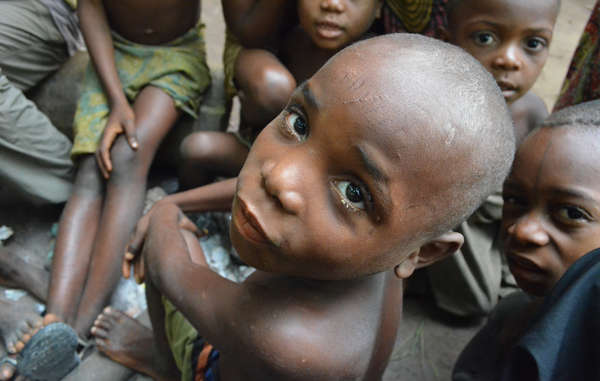
by Deep Green Resistance News Service | Jan 8, 2018 | Colonialism & Conquest
Featured image: A recent epidemic in the Republic of Congo is said to have been aggravated by the loss of indigenous peoples’ resources due to conservation and logging projects. © C. Fornellino Romero/Survival International
by Survival International
A Congolese organization has recently raised concerns that conservation contributed to the deaths of several dozen children, mostly Bayaka “Pygmies,” during an epidemic in 2016 in the Republic of Congo – the latest in a long line of related reports.
The deaths have been attributed by a medical expert to malaria, pneumonia and dysentery, aggravated by severe malnutrition.
Conservation-related malnutrition among Bayaka children in this region has been reported since 2005 at least, as the Bayaka are prevented from hunting and gathering on their lands by wildlife guards through violence and intimidation.
These guards are funded and equipped by the Wildlife Conservation Society (WCS), one of the world’s largest conservation organizations, and the logging company it has partnered with, CIB. Both organizations have failed to take effective action to prevent abuse.
“The wildlife guards abuse us. They don’t want us to go into the forest. How can we feed our children?” a Bayaka man from Mbandza, the site of the epidemic, told Survival in 2016.
These guards have been accused of abusing Bayaka and stealing their food for over 13 years. One such attack that took place in Mbandza in early 2016 left one man hospitalized.
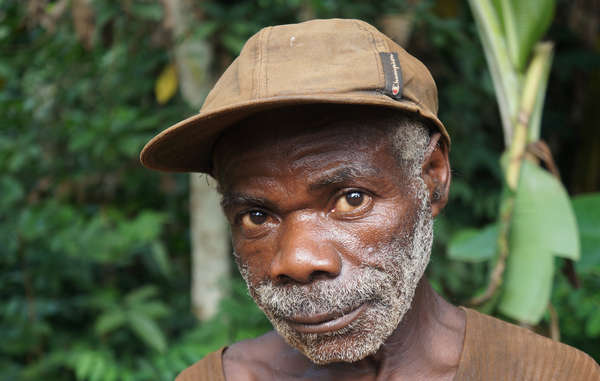
The Baka and Bayaka’s consent is required by law for any major project on their lands, but this is ignored by WWF and WCS. © Survival International
In this way, the Bayaka are being illegally evicted from their ancestral homelands by threat of violence. As one Bayaka woman explained: “If we go into the forest we eat well there compared to the village. We eat wild yams and honey. We want to go into the forest but they forbid us to. It frightens us. It frightens us.”
Critics have noted that the guards have also failed to protect the wildlife the Bayaka depend on for food, since they have difficulty tackling corruption and the creation of logging roads, the two main drivers of poaching.
Plummeting health has been reported among Bayaka living in the Dzanga-Sangha Protected Areas in the Central African Republic – one of the World Wildlife Fund’s (WWF) flagship projects – since 2006. Conditions encountered among older women “would be considered a public health crisis by international health agencies,” according to research published in 2016.
Increased malnutrition and mortality have been reported among Baka “Pygmies” in Cameroon, where WWF also operates, and among Batwa “Pygmies” in another of WCS’s project sites in east Democratic Republic of Congo.
“Now we are afraid of the anti-poaching squads. Before when a woman gave birth we took her to the forest to help her regain her strength and weight, now we can’t do this. We would take our children to the forest to avoid epidemics. Now we know illnesses we never knew before,” one Baka woman in Cameroon told Survival.
Watch Baka describe the abuse they face as a result of WWF’s conservation projects
Baka health plummets due to conservation
In the Congo Basin, the Baka, Bayaka and dozens of other rainforest peoples are being illegally evicted from their ancestral homelands in the name of conservation. Their health is plummeting as a result.
The big conservation organizations that support these conservation projects, like the World Wildlife Fund (WWF), refuse to abide by basic international standards and secure their consent.
Neither WCS nor WWF has attempted to secure the indigenous peoples’ consent, as basic due diligence and their own human rights policies require.
Survival’s Director Stephen Corry said: “Land theft is a serious and deadly crime, as these reports show. Many associate conservation with reason and compassion but, for Baka and Bayaka, it often means mindless violence and plummeting health. When will WWF and WCS finally start complying with their own human rights policies? ”
Timeline
1996: The organization Berggorilla & Regenwald Direkthilfe finds that malnutrition and mortality has increased among Batwa “Pygmies” since they were evicted from Kahuzi-Biega, a national park in east Democratic Republic of Congo (DRC) funded by WCS.
1997: WWF observes that the fact that the Bayaka are banned from hunting or gathering inside the Dzanga-Ndoki Park, the park in the Central African Republic (CAR) that WWF helped to create, “punishes [the Bayaka] severely” and is undermining their food security.
2000: A study finds that the Batwa in Kahuzi-Biega, DRC, are suffering from nutritional deficiencies, because they are no longer able to hunt in the forest, and soaring mortality rates. Malnutrition is particularly pronounced among women and children.
2004: A BBC investigation into CIB’s logging concessions in Congo hears from a Bayaka man: “We get so much suffering because of [wildlife] guards. We can’t go and find things in the forest as we used to. All we hear is hunger.”
2004: Bayaka from another community in Congo report to Greenpeace: “Then we met another white man (WCS) who came to tell us to stop hunting and that the wildlife guards would make sure we did. Now we are afraid to go far in the forest in case the wildlife guards catch us so we have to stay in the village. […] Now we are dying of hunger.”
2005: The Congolese Observatory on Human Rights, the organization that reported on the 2016 epidemic, documents three cases of violent abuse against Bayaka by wildlife guards, and warns that some Bayaka “are dying of hunger.”
2005: A news report recounts how Bayaka in one of CIB’s logging concessions describe being targeted by wildlife guards that mistreat and temporarily imprison them, and how this has led to more frequent malnutrition among children and vulnerable adults.
2006: WWF and its partners commission a report that finds that the Bayaka in Dzanga-Sangha, CAR, are struggling to feed themselves. The Bayaka interviewed for the report state that the conservation project has forced them out of some of their richest hunting and gathering grounds. They report that wildlife guards harass or attack them even when they try to use the reduced areas of land they have left, all the while accepting bribes from the real poachers who were emptying the forest of its wildlife. Some Bayaka women are finding it so hard to find food, the investigator hears, that they have been driven to sex work in the nearby town.
2006: An article in The Lancet cautions that “Pygmy peoples’ health risks are changing as the central African forests, which are the basis for their traditional social structure, culture, and hunter-gatherer economy, are being destroyed or expropriated by […] conservation projects:”
2008: UNICEF warns that the Bayaka’s right to gather resources is being “flouted on the most basic level because indigenous people no longer have access to areas rich in game” due to protected areas in Congo.
2012: An anthropologist with 18 years’ experience working with Bayaka in Congo reports increasingly poor nutrition and increased mortality. He attributes this to the removal of forest resources by loggers and to “conservationists’ exclusionary and draconian management practices.”
2013: A researcher at the University of Oxford reports that the combined impact of conservation and logging have led to poorer health and higher levels of drug and alcohol addiction among the Bayaka. He argues that conservation efforts would benefit from gaining people’s consent
2014: A medical study finds that “punitive anti-poaching measures” and dwindling wildlife have caused health to plummet among Bayaka in Dzanga-Sangha, CAR, particularly among women. “It is disheartening to see health decline so closely tied […] to the conservation management policies of the last twenty-five years,” the study’s authors note.
2015: A doctor with extensive experience working in CIB’s logging concessions reports that: “Aside from wounds inflicted by gorillas, buffalo or other wild animals, my colleague and I also see [gun] wounds in people claiming to have been attacked – sometimes without warning – by the protectors of wildlife: the wildlife guards.”
2015: The same doctor tells Survival: “I find this [wildlife guard violence] a very serious problem and in my opinion most wildlife guards have other motives than protecting the animals to work as a wildlife guard.”
2016: A second doctor with extensive experience working in CIB’s logging concessions describes to Survival the seasonal malnutrition she encounters among Bayaka, which she attributes to repressive conservation policies.
“Pygmy” is an umbrella term commonly used to refer to the hunter-gatherer peoples of the Congo Basin and elsewhere in Central Africa. The word is considered pejorative and avoided by some tribespeople, but used by others as a convenient and easily recognized way of describing themselves.
by Deep Green Resistance News Service | Sep 25, 2017 | Colonialism & Conquest
Featured image: World Wildlife Fund (WWF) has been working in the Congo Basin for decades – supporting squads who have committed violent abuse against tribal people. © WWF
by Survival International
A new Survival International report details widespread and systematic human rights abuses in the Congo Basin, by wildlife guards funded by the World Wildlife Fund (WWF) and other big conservation organizations.
The report documents serious instances of abuse between 1989 and the present day in Cameroon, the Republic of Congo, and the Central African Republic (CAR) by guards funded and equipped by WWF and the Wildlife Conservation Society (WCS), the parent organization of New York’s Bronx zoo.
It lists more than 200 instances of abuse since 1989, including pouring hot wax onto exposed skin, beating, and maiming with red-hot machetes. These incidents are likely just a tiny fraction of the full picture of systematic and ongoing violence, beatings, torture and even death.
As well as these especially cruel incidents, the report also documents the forms of harassment that have become part of everyday life for many people, including threats, and the destruction of food, tools and personal belongings.
Read the full report here.
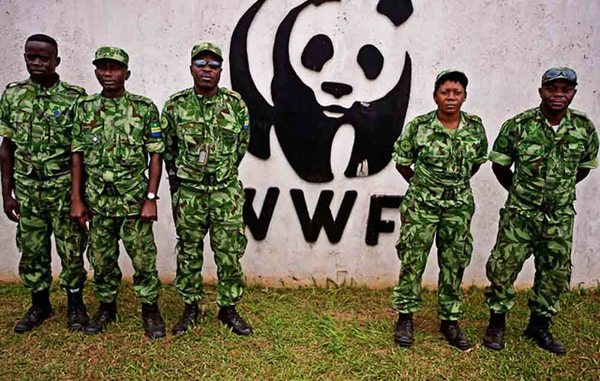
WWF funded guards in Gabon. © WWF
As well as Survival, over the past three decades, numerous independent experts and NGOs have raised concerns about these abuses. These have included NGOs like Greenpeace, Oxfam, UNICEF, Global Witness, Forest Peoples Programme, and research specialists from University College London, the University of Oxford, Durham University, and Kent University.
WWF and WCS have even partnered with several logging companies, despite evidence that their activities are unsustainable, and have not had the consent of tribal peoples as required by international law and their own stated policies.
One Bayaka man said: “A wildlife guard asked me to kneel down. I said: “Never, I could never do that.” He said: “If you don’t get down on your knees I’m going to beat you.”
A Baka woman said: “They took me to the middle of the road and tied my hands with rubber cord. They forced my hands behind my back and cut me with their machete.”
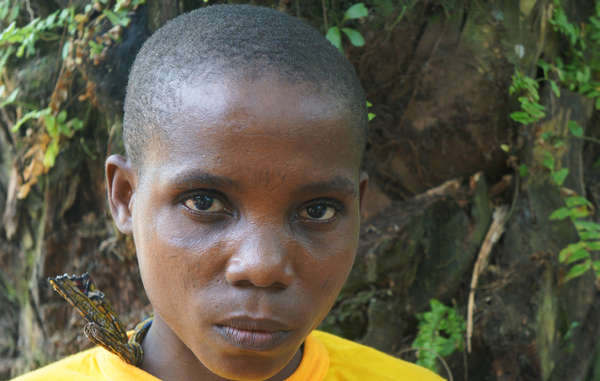
Survival has documented hundreds of instances of abuse, and collected testimonies from many “Pygmy” people. © Survival International
A Bayaka woman said: “They started kicking me all over my body… I had my baby with me. The child had just been born three days before.”
Tribal peoples have been dependent on and managed their environments for millennia. Their lands are not wilderness. Evidence proves that tribal peoples are better at looking after their environment than anyone else.
But big conservation organizations like WWF are partnering with industry and tourism and destroying the environment’s best allies. Now tribal people are accused of “poaching” because they hunt to feed their families. And they face arrest and beatings, torture and death, while big game trophy hunters are encouraged.
Survival’s Director Stephen Corry said: “This shocking report lays out, in detail, the abuse and persecution that “conservation” has brought the indigenous and tribal peoples of the Congo Basin. These are just the cases that have been documented, it’s impossible to imagine there aren’t a lot more which remain hidden.
“The big conservation organizations should admit that their activities in the region have been catastrophic, both for the environment and for the tribal peoples who guarded these forests for so long.
“WWF and WCS supporters might ask these organizations how they could have let this situation carry on for so long – and what they’re going to do now to make sure it stops.”
“Pygmy” is an umbrella term commonly used to refer to the hunter-gatherer peoples of the Congo Basin and elsewhere in Central Africa. The word is considered pejorative and avoided by some tribespeople, but used by others as a convenient and easily recognized way of describing themselves.
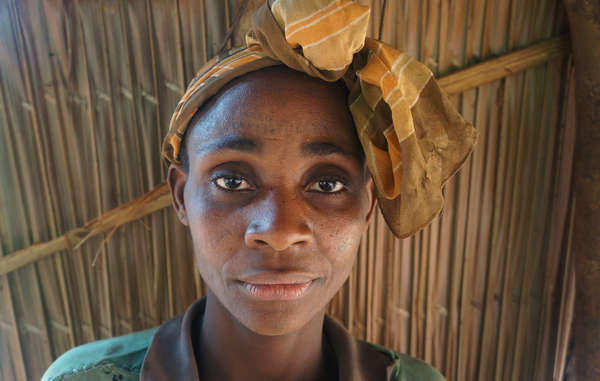
by Deep Green Resistance News Service | Sep 6, 2017 | Lobbying
Featured image: This Baka woman and her husband are among many tribal people in Cameroon who have been beaten by WWF-funded wildlife guards. They were attacked and had their belongings taken from them while they were collecting wild mangoes. © Survival International
by Survival International
The landmark mediation talks between Survival and the World Wildlife Fund (WWF) over breaches of Organization for Economic Co-Operation and Development (OECD) guidelines for multinational corporations have broken down over the issue of tribal peoples’ consent.
Survival had asked WWF to agree to secure the Baka “Pygmies’” consent for how the conservation zones on their lands in Cameroon were managed in the future, in line with the organization’s own indigenous peoples policy.
WWF refused, at which point Survival decided there was no purpose continuing the talks.
Survival lodged the complaint in 2016, citing the creation of conservation zones on Baka land without their consent, and WWF’s repeated failure to take action over serious human rights abuses by wildlife guards it trains and equips.
It is the first time a conservation organization has been the subject of a complaint under the OECD guidelines. The resulting mediation was held in Switzerland, where WWF is headquartered.
WWF has been instrumental in the creation of several national parks and other protected areas in Cameroon on the land of the Baka and other rainforest tribes. Its own policy states that any such projects must have the free, prior and informed consent of those affected.
A Baka man told Survival in 2016: “[The anti-poaching squad] beat the children as well as an elderly woman with machetes. My daughter is still unwell. They made her crouch down and they beat her everywhere – on her back, on her bottom, everywhere, with a machete.”
Another man said: “They told me to carry my father on my back. I walked, they beat me, they beat my father. For three hours. Every time I cried they would beat me, until I fainted and fell to the ground.”
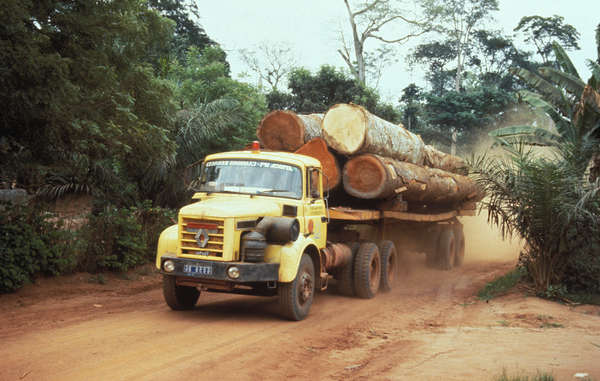
Conservation has been used as a justification for forcibly denying Baka access to their land, but the destruction of the rainforest by logging companies – some of whom are WWF partners – has continued. © Margaret Wilson/Survival
Background briefing
– Survival first raised its concerns about WWF’s projects on Baka land in 1991. Since then, Baka and other local people have repeatedly testified to arrest and beatings, torture and even death at the hands of WWF-funded wildlife guards.
– The OECD is the Organization for Economic Co-Operation and Development. It publishes guidelines on corporate responsibility for multinationals, and provides a complaint mechanism where the guidelines have been violated.
– The complaint was lodged with the Swiss national contact point for the OECD, as WWF has its international headquarters in Switzerland. Talks took place in the Swiss capital, Bern, between representatives of WWF and Survival.
– The principle of Free, Prior and Informed Consent (FPIC) is the bedrock of international law on indigenous peoples’ rights. It has significant implications for big conservation organizations, which often operate on tribal peoples’ land without having secured their consent.
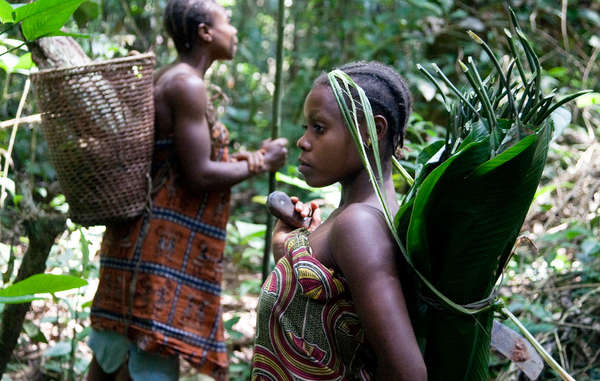
Tribes like the Baka have lived by hunting and gathering in the rainforests of central Africa for generations, but their lives are under threat. © Selcen Kucukustel/Atlas
Tribal peoples like the Baka have been dependent on and managed their environments for millennia. Contrary to popular belief, their lands are not wilderness. Evidence proves that tribal peoples are better at looking after their environment than anyone else. Despite this, WWF has alienated them from its conservation efforts in the Congo Basin.
The Baka, like many tribal peoples across Africa, are accused of “poaching” because they hunt to feed their families. They are denied access to large parts of their ancestral land for hunting, gathering, and sacred rituals. Many are forced to live in makeshift encampments on roadsides where health standards are very poor and alcoholism is rife.
Meanwhile, WWF has partnered with logging corporations such as Rougier, although these companies do not have the Baka’s consent to log the forest, and the logging is unsustainable.
Survival’s Director Stephen Corry said: “The outcome of these talks is dismaying but not really surprising. Conservation organizations are supposed to ensure that the ‘free, prior and informed consent’ of those whose lands they want to control has been obtained. It’s been WWF’s official policy for the last twenty years.
“But such consent is never obtained in practice, and WWF would not commit to securing it for their work in the future.
“It’s now clear that WWF has no intention of seeking, leave alone securing, the proper consent of those whose lands it colludes with governments in stealing. We’ll have to try other ways to get WWF to abide by the law, and its own policy.”
Watch: Baka father speaks out against horrific abuse
“Pygmy” is an umbrella term commonly used to refer to the hunter-gatherer peoples of the Congo Basin and elsewhere in Central Africa. The word is considered pejorative and avoided by some tribespeople, but used by others as a convenient and easily recognized way of describing themselves.
by Deep Green Resistance News Service | Jan 23, 2017 | Colonialism & Conquest
Featured image: Without access to their ancestral land, the Baka’s health has deteriorated and they face an uncertain future. © Survival International
by Survival International
An internal report commissioned by the World Wildlife Fund (WWF) into the impact of its conservation work in Cameroon on Baka “Pygmies” has been leaked after WWF denied it existed. It reveals:
—WWF knew that the Baka had not been consulted over the national parks which have taken over their land. However, the organization has since maintained publicly that there was “a high level of … community consent.”
—Some ecoguards patrolling the area “behave like masters and lords” towards the Baka, mounting “crackdowns” that are “terrifying.” Despite this, a WWF spokesman described the ecoguards as “performing their designated function of protecting the forests and securing the access and areas of forest communities, including … the Baka.”
—Many perpetrators of abuses are not disciplined when violations are reported by the communities “despite the communities’ condemnation, with proof.” WWF, however, continues to say publicly, “When unacceptable behavior has come to WWF’s attention… WWF has taken the issue up directly and emphatically with [the government], and improved behavior has seemed to follow.”
—“Most of the local villages are affected [by ecoguard abuse]” – but WWF maintained in a written submission to the OECD that “the possibility of ecoguard abuse does not currently seem to be a high priority for most Baka communities.”
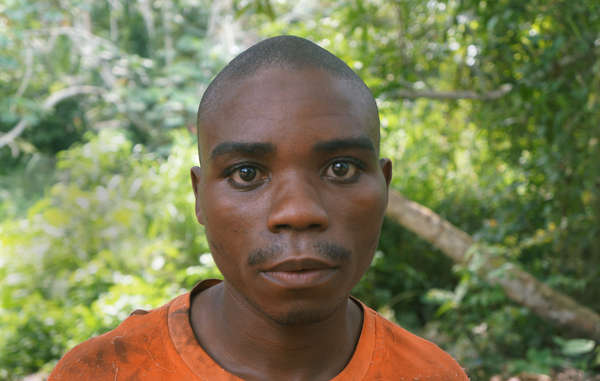
This Baka man was beaten by guards. Survival has spoken to dozens of similar victims across the Congo Basin.
© Survival International
Contrary to its own guidelines, WWF has never released the report, despite requests from Survival International and Baka activists. In an interview with the environmental magazine Mongabay, WWF’s “Head of Issues Management” Phil Dickie denied that WWF had commissioned any investigation into Survival’s allegations.
Survival International lodged a formal complaint in February 2016 with the Swiss National Contact Point of the OECD over WWF’s activities in Cameroon. The complaint was admitted in December 2016, the first time a non-profit organization has been scrutinized in this way.
One Baka man said: “The forest used to be for the Baka but not anymore. We would walk in the forest according to the seasons but now we’re afraid. How can they forbid us from going into the forest? We don’t know how to live otherwise. They beat us, kill us and force us to flee.”
Survival’s Director Stephen Corry said: “WWF commissions a report to look into its effect on the Baka, presumably including claims of abuse committed by the ecoguards it funds. The report confirms the abuse is widespread and routine. WWF then denies the report exists. It’s time for this big conservation organization to square up to the responsibilities it has to those who have seen their land stolen for conservation. And it’s time the world woke up to the horror that’s going on in the name of conservation. It’s not just Cameroon and not just WWF: the conservation industry has a history of taking tribal people’s land. It’s green colonialism and we’re doing all we can to fight it. Many conservationists know that tribal peoples are the best guardians of the natural world which is why the big conservation organizations should start listening to them rather than conspiring in their destruction.”
See here for a comparison of what WWF’s internal report says about Baka abuse with what WWF have said publicly, and what the Baka say. The full report is available on request.
“Pygmy” is an umbrella term commonly used to refer to the hunter-gatherer peoples of the Congo Basin and elsewhere in Central Africa. The word is considered pejorative and avoided by some tribespeople, but used by others as a convenient and easily recognized way of describing themselves.
by Deep Green Resistance News Service | Dec 18, 2016 | Colonialism & Conquest
Featured image: The Congo Basin tribes have lived sustainably in the forests of central Africa for generations.
© Selcen Kucukustel/Atlas
by Survival International
In an unprecedented protest, 19 “Pygmy” communities in central Africa have denounced conservation projects on their land. Eleven of the communities have urged conservationists to stop funding the anti-poaching squads who have abused them.
The Worldwide Fund for Nature (WWF) and the Wildlife Conservation Society (WCS) – two of the world’s biggest conservation organizations – have helped to create protected areas in the region from which tribal peoples have been illegally evicted.
The Baka and Bayaka “Pygmies” and their neighbors have endured years of violence, intimidation and abuse as a result of these conservation projects in Cameroon, the Congo, and the Central African Republic. But the organizations behind them, including WWF and WCS, have failed to change their approach, and continue to fund the squads.
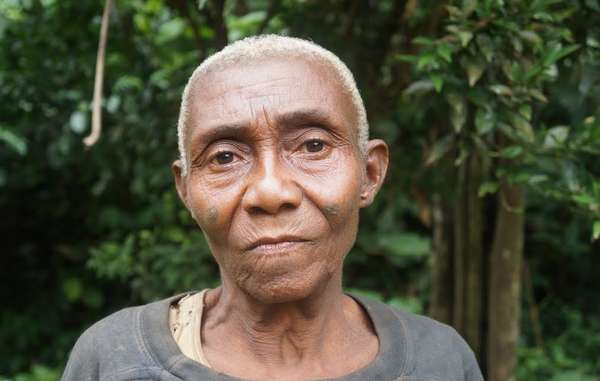
Ndoye, a Baka woman from Cameroon. Five people are reported to have died in her community alone at the hands of WWF-funded wildlife guards.
© Survival
In one letter Baka said: ”How are we going to survive in this world? We say to those who are giving money to [the conservationists]: ‘Do you want them to kill us?’ We no longer live well.”
Bayaka from the village of Socambo, said: “Despite the money that you provide to conserve the forest, we don’t benefit at all. Our ancestors lived perfectly well in this forest… Please think of us poor indigenous people who use our forest. We are fed up with how the project has cut us off from the forest.”
Bayaka from Mossapoula said: “We … are suffering a lot because of conservation. The guards threaten us, beat us, steal from us, even outside the park. And yet we have the right to enter the park. We ask you to come to Mossapoula before continuing your funding in order to hear our problems and seek our consent.”

Saki, a Bayaka woman whose husband was found murdered in the forest. From evidence at the scene, the family is convinced that he was killed by wildlife guards.
© Survival
The Bakwele chief of Ndongo said: “WWF has been coming here since 1996. We used to be very happy. But now we find ourselves marginalized and tormented in every way… We here are now only living on rice, really. Sir, your agents are very, very aggressive and we don’t want them to come here any more.
“In short, to those funders: if you have any projects, come to the field yourselves. I repeat: your agents are not here for work but for corruption. The guards have become the real poachers. They no longer respect the park limits. We no longer have access to the park.”
“Pygmies” face harassment and beatings, torture and even death while big game trophy-hunting tourists are encouraged. Tribal peoples are illegally evicted from large parts of their ancestral land and forced to live on roadsides where poverty and disease are rife. They have faced violence and plummeting health standards in the name of conservation – while WWF and WCS partner with logging companies like Rougier, CIB and SINFOCAM.
Survival’s Director Stephen Corry said: “As these powerful statements from “Pygmies” show, conservation projects are proving deadly for tribal peoples in the Congo Basin. As they see it, WWF and WCS have taken their land, ignored their rights, and continue to fund those abusing them. WWF and WCS have turned natural allies of conservation into its victims. The big conservation organisations really must start listening to these tribal peoples.”

Cameroonian wildlife guard Mpaé Désiré, who in 2015 was accused of beating Baka and in 2016 was arrested for involvement in the illegal wildlife trade.
© Facebook
Background briefing
– WWF has been active in the Congo Basin for decades. Survival first raised concerns over its proposed projects in 1991.
– The region is home to dense rainforests and several iconic species, including the giant pangolin, lowland gorilla and forest elephant. Tribal peoples like the Baka and Bayaka have been dependent on and managed this environment for generations.
– According to European Union reports, no logging activity in Cameroon is being carried out lawfully. Despite this, WWF has entered into partnerships with several companies who are active in the region.
– WWF cites the need to protect wildlife from poachers as the justification for funding, training and equipping wildlife guards. However, several of these guards have themselves been involved in the illegal wildlife trade. Earlier this year, for example, one guard, Mpaé Desiré was arrested for involvement in the illegal wildlife trade.
– A Baka man told Survival: “Guards used to open tins of sardines and leave them as bait to attract leopards, so they could hunt them for their skins.” Rainforest tribes have unparalleled knowledge of their environment, but WWF has instead put its faith in armed guards and corrupt officials.
Tribal peoples have been dependent on and managed their environments for millennia. Their lands are not wilderness. Evidence proves that tribal peoples are better at looking after their environment than anyone else. They are the best conservationists and guardians of the natural world. They should be at the forefront of the environmental movement.
But tribal peoples are being illegally evicted from their ancestral homelands in the name of conservation. The big conservation organizations are guilty of supporting this. They never speak out against evictions.
The big conservation organizations are partnering with industry and tourism and destroying the environment’s best allies.
Watch: Baka describe beatings and abuse at hands of anti-poaching squads.
“Pygmy” is an umbrella term commonly used to refer to the hunter-gatherer peoples of the Congo Basin and elsewhere in Central Africa. The word is considered pejorative and avoided by some tribespeople, but used by others as a convenient and easily recognized way of describing themselves











